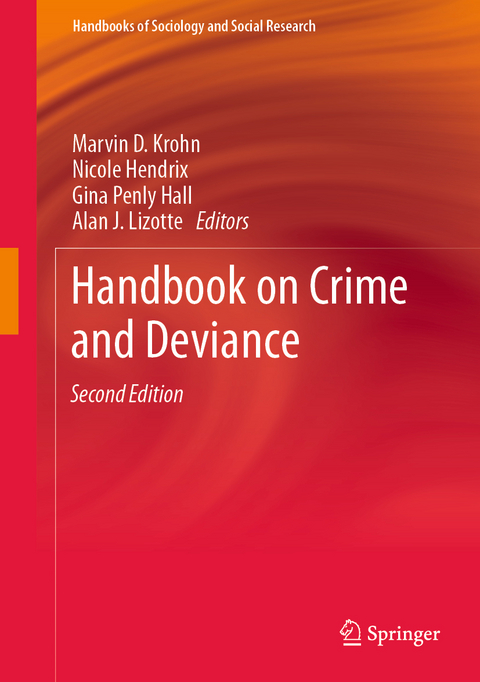
Handbook on Crime and Deviance
Springer International Publishing (Verlag)
978-3-030-20778-6 (ISBN)
This 2nd edition of the Handbook provides an interdisciplinary coverage of new understandings of the most important developments in the sociology of crime and deviance that is current and emerging for research, methodology, practice, and theory in criminology. It fosters research to take the fields of criminology and criminal justice in new directions. Unlike any other handbook, it includes chapters on cutting-edge quantitative data and analytical techniques that are shaping the future of empirical research and expanding theoretical explanations of crime and deviance. It further devotes a section to the most current and innovative methodological issues. Chapters are updated providing an inclusive discussion of the current research and the theoretical and empirical future of crime and deviance. This handbook is of great interest for advanced undergraduates, graduates students, researchers and scholars in criminology, criminal justice, sociology and related fields, such as social welfare, economics, and psychology.
Marv Krohn is currently a Professor in the Department of Sociology and Criminology & Law at the University of Florida. Professor Krohn has a long-standing interest in the etiology of delinquency and drug use, focusing primarily on social process and life course approaches. For the past thirty years he has been a Co-Principal Investigator on the Rochester Youth Development Study, a three generational longitudinal panel study targeting those at high risk for serious crime and delinquency. His book (with co-authors Terence P. Thornberry, Alan J. Lizotte, Carolyn A. Smith and Kimberly Tobin), Gangs and Delinquency in Developmental Perspective, was the American Society of Criminology's recipient of the 2003 Michael J. Hindelang Award for Outstanding Scholarship. Professor Krohn also co-authored Delinquent Behavior (with Don C. Gibbons) and Researching Theories of Crime and Delinquency (with Charis E. Kubrin and Thomas D. Stucky) and has co-edited seven compendiums on crime and delinquency. In addition, he has contributed numerous research articles and book chapters. He is a former Vice President and Executive Counselor of the American Society of Criminology and was named a Fellow of that Society. Professor Krohn has also won teaching awards at both SUNY Albany and the University of Florida and most recently was presented with the Outstanding Mentor Award by the Academy of Criminal Justice Sciences. Gina Penly Hall, Ph.D. has published numerous articles and book chapters over the years. At the core of her substantive interests are the theoretical ideas of social ecology, with her research focusing on how human behavior is a product of how individuals interact with their environments. She currently works with youth in a school setting as a Learning Strategist where she coordinates and implements academic and behavioral interventions. Alan Lizotte Distinguished Professor in the School of Criminal Justice, The University at Albany. He is co-principal investigator on the Rochester Youth Development Study, an ongoing thirty year longitudinal study of juvenile delinquency and drug use covering three generations of subjects. His substantive interests include illegal firearms ownership and use and developmental criminology. In 2003, he and his coauthors were awarded the American Society of Criminology's Hindelang Award for the book Gangs and Delinquency in Developmental Perspective. Professor Lizotte is an American Society of Criminology Fellow. Nicole Hendrix is a Professor in the Department of Criminal Justice at Radford University. She earned her doctoral degree from the University at Albany. Her research has bridged the academic and professional realms within the field of criminal justice and included a number of projects involving agencies and institutions within criminal justice across Virginia and in other states. Her research interests varies as she applies her research methodology skills to a diverse array of topics and projects.
I. Methodological Issues in Criminological Research; Alan Lizotte.- 1. Place-Based Data, Methods and Analysis: Past, present, and Future; Martin Andresen and Tarah Hodgkinson.- 2. NIBRS as the New Normal: What Fully Incident-Based Crime Data Mean for Researchers; Lynn A. Addington.- 3. Ethical Controversies In Engaged Research Nicole Janich and David E. Duffee.- 4. Victimization at Schools and on College and University Campuses: Historical Development and Applications of Opportunity Framework, Leah C. Butler, Teressa C. Kulig, Bonnie S. Fisher and Pamela Wilcox.- II. Explanations of Crime; Marvin D. Krohn.- 5. The Biosocial Perspective: A Brief Overview and Potential Contributions to Criminological Theory; Joseph A. Schwartz, Anthony Walsh and Kevin M. Beaver.- 6. The Social Learning Theory of Crime and Deviance; Ronald L. Akers and Wesley G. Jennings.- 7. Self-Control Theory: Theoretical and Research Issues; Michael Rocque and Alex R. Piquero.- 8. General Strain Theory; RobertAgnew and Timothy Brezina.- 9. Institutional-Anomie Theory: An Evolving Research Program; Steven F. Messner, Richard Rosenfeld and Andreas Hövermann.- 10. Labeling Theory; Jón Gunnar Bernburg.- 11. Social Disorganization Theory: Past, Present and Future, Charis E. Kubrin and Michelle D. Mioduszewski.- 12. Social Support and Crime; Cecilia Chouhy.- 13. Control Balance Theory of Deviance; Charles R. Tittle and Cindy Brooks Dollar.- 14. Situational Action Theory: A General, Dynamic and Mechanism-Based Theory of Crime and its Causes; Per-Olof H Wikström.- 15. Developmental and Life-Course Theories of Crime and Deviance; Jeffrey T. Ward.- 16. The "Great American Crime Decline": Possible Explanations; Maria Tcherni-Buzzeo.- III. Criminal Justice Issues.- 17. Targeted Policing for Crime Reduction; Anthony A. Braga and Lisa Barao.- 18. Situational Crime Prevention: Theory, Practice and Evidence; John E. Eck and Ronald V. Clarke.- 19. Desistance from Crime: Past to Present; Michael Rocque and Lisa Slivken.- 20. American Capital Punishment Over Changing Times: Policies and Practices; James R. Acker.- 21. Mental Illness and the Criminal Justice System: Issues and Considerations; Erin M. Falconer.- 22. Hate Crimes: Perspectives on Offending and the Law; Ryan D. King.- 23. Cybercrime; Catherine D. Marcum and George E. Higgins.- IV. Special Topics in Crime and Deviance.- 24. The Crucial Role of Friendships and Peer Relationships in the Etiology of Crime, Deviance, and Substance Use; John H. Boman, IV.- 25. Youth Gangs: Structures and Group Violence; James C. Howell.- 26. Comorbidity of Substance Use and Violence; Helene R. White, Fiona N. Conway, and Judit H. Ward.- 27. Shots in the Dark: Enlightening the Gun Control Debate; Richard L. Legault, Nicole Hendrix and Alan J. Lizotte.- Chapter 28. Family Violence and Delinquency; Timothy O. Ireland, Carolyn A. Smith and Cheyenne Loveland.- 29. Environmental and Green Crime; Matt Nobles.- 30. Employment, Crime, and Devianceacross the Life-Course; John M. Eassey.- 31. Terrorist Decision-Making, Ideology and Counterterrorism; Rose Bellandi.
| Erscheinungsdatum | 11.09.2019 |
|---|---|
| Reihe/Serie | Handbooks of Sociology and Social Research |
| Zusatzinfo | XII, 639 p. 29 illus., 9 illus. in color. |
| Verlagsort | Cham |
| Sprache | englisch |
| Maße | 178 x 254 mm |
| Gewicht | 1417 g |
| Themenwelt | Recht / Steuern ► Strafrecht ► Kriminologie |
| Sozialwissenschaften ► Soziologie | |
| Schlagworte | Biosocial Criminology • crime and unemployment • crime in schools • Criminology and Criminal Justice • Cybercrime and Prevention • Desistance of Crime • Developmental and Life Course Theory • Family violence • Green Criminology • Legal and Illegal Gun Ownership in America • Mental Health Issues and Crime • Methodological Issues in Crime Research • Preventing Crime • Self Control Theory • Sociology of Crime and Deviance • Terrorism and Crime |
| ISBN-10 | 3-030-20778-1 / 3030207781 |
| ISBN-13 | 978-3-030-20778-6 / 9783030207786 |
| Zustand | Neuware |
| Haben Sie eine Frage zum Produkt? |
aus dem Bereich


